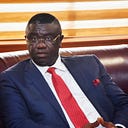Keynote Address By Hon. Minister of State, Budget And National Planning At The Virtual Voluntary National Review (VNR) Validation Workshop
The following is the text of the keynote address I gave today at the Virtual National Validation Workshop On Nigeria’s 2020 Voluntary National Review (VNR) On Sustainable Development Goals — May 28th, 2020.
I am pleased to join you today in this workshop for the validation of the report of Nigeria’s 2020 Voluntary National Review (VNR) on the Sustainable Development Goals (SDGs).
The validation of the report today is very remarkable as it shows the level of commitment that Nigeria has demonstrated towards the attainment of the SDGs, particularly, after the United Nations General Assembly meeting in September, 2019.
It also indicated that Nigeria was not deterred by the visible challenges posed by COVID-19 Pandemic which has put the entire world under siege since the beginning of the year.
Let me, therefore, express my appreciation to His Excellency, President Muhammadu Buhari, GCFR who gave all the necessary support for the achievements we have recorded so far.
I also wish to commend the Senior Special Assistant to President on SDGs [SSAP-SDGs] and her team as well as the relevant Sector MDAs at both Federal and State levels who have contributed to the modest achievements and the milestones we have accomplished.
Distinguished participants, I am aware that, following the adoption of the Sustainable Development Goals (SDGs) in 2015; member countries of the United Nations were encouraged to undertake periodic Voluntary National Reviews (VNRs) of their implementation of the SDGs.
The review is aimed at assessing progress as well as identifying key challenges in the implementation of the Global Agenda.
A quick review of Nigeria’s 2020 Voluntary National Review shows a careful attempt to demonstrate how the economic, social, and environmental dimensions of the SDGs were integrated into the cardinal objectives of Nigeria’s Economic Recovery and Growth Plan [ERGP 2017–2020].
Indeed, the period covered by the 2020 VNR, that is 2017–2020, fits perfectly into the timeframe of the ERGP. I am also aware that this review is the second in the series and that the outcome will be part of Nigeria’s presentation at the 2nd VNR to the High-level Political Forum [HLPF] in July 2020.
Interestingly, this second review exercise coincides with the period that Government is preparing a Medium-Term National Development Plan 2021–2025 and a Perspective Plan, Nigeria Agenda 2050 to succeed the outgoing ERGP &NV20:2020 whose operations will come to an end in December 2020.
It would be recalled that His Excellency, President Muhammadu Buhari, GCFR launched the domestication of the integrated Sustainable Development Goals [iSDGs] Simulation Model at the Nigeria Side Event during UNGA in September 2019. We had assured the global community that Nigeria will mainstream the SDGs in her National Development Plans.
I am pleased to inform this gathering that in line with actualising Mr. President’s promise, the Federal Ministry of Finance, Budget and National Planning is already integrating the SDGs into the National Development Plans — both medium and long term Plans.
Presently, the Ministry is preparing the Macroeconomic Framework that will underpin the two new National Development Plans. In fact, the Ministry is currently working with modelling experts who are combining the iSDG Model and Dynamic Computable General Equilibrium Model for the preparation of the Macroeconomic Framework of the Perspective Plan, Nigeria Agenda 2050 while the Econometric and Dynamic Input-Output [I-O] Models are being employed for the development of Macroeconomic Framework for the Medium Term National Development Plan [MTNDP 2021- 2025. It is our desire to build the capacity of the relevant Officers of the Ministry and indeed other core MDAs on the Models as soon as the COVID-19 dust finally settles down.
While efforts will continue to be made to properly mainstreamed the SDGs in the new Plans to accelerate the attainment of the Goals, the Office of the SSAP on SDGs and indeed all key MDAs are enjoined to work with our Ministry to ensure that SDGs programmes and projects are adequately catered for in the new Plans.
I, therefore, look forward to working with SDGs Office and other MDAs in giving Nigerians new Plans that provide for a better tomorrow.
As we validate this National Report, let us recognise that this is the beginning of the journey to using it for policy advocacy, not only for the SDGs but also for the National Development Plans.
I wish you all a productive Validation Meeting. Thank you all for your attention.
